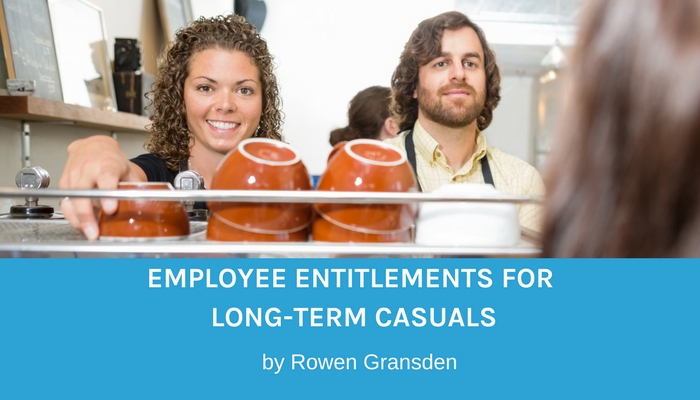
19 Apr Employee Entitlements for Long-Term Casuals
The Fair Work Ombudsman has recently clarified employee entitlements for long-term casual employees.
Who Is A Casual Employee?
For some time, there has been uncertainty about employee entitlements for long-term casuals,especially when they have worked in a pattern of ‘regular and systematic employment” for more than 12 months.
A casual employee is someone who:
- Has no guaranteed hours of work.
- Usually works irregular hours (but can work regular hours).
- Doesn’t get paid sick or annual leave.
- Can end employment without notice, unless notice is required by a registered agreement, award or employment contract.
How Is Casual Different?
Full-time and part-time employees have ongoing employment (or a fixed-term contract) and can expect to work regular hours each week. They are entitled to paid sick leave and annual leave. Full-time and part-time employees must give or receive notice to end the employment.
Casual Employee Entitlements
Casuals can expect a higher hourly rate than equivalent full-time or part-time employees. This is called a casual loading and is paid because they don’t get benefits such as sick or annual leave. In addition, casual employees are entitled to:
- Two days unpaid carer’s leave.
- Two days unpaid compassionate leave per occasion.
- Unpaid community service leave.
What Is A Long-term Casual Employee?
Some casual employees who work regular hours or the same days each week over a long period and become long-term casuals. Long term casuals remain casual employees unless they formally change to full-time or part-time employment. They don’t automatically become permanent employees, even if they are called a permanent casual. They get their casual entitlements regardless of how regularly they work or how long they work for.
After 12 months of regular employment, and if it’s likely the regular employment will continue, a casual employee can:
- Request flexible working arrangements.
- Take parental leave.
However, they don’t get paid leave or notice of termination, even if they work regularly for a long time.
Changing To Full-time Or Part-time Employment
A casual employee can change to full-time or part-time employment at any time if the employer and employee both agree to it.
Some enterprise agreements, registered agreements and awards have a process for changing casual employees to full-time or part-time. For an award example, see Manufacturing and Associated Industries and Occupations Award 2010 (refer to section 14.4).
Further Reading:
This is an important clarification in respect to “long term casuals” and the Fair Work Ombudsman site reference is: https://www.fairwork.gov.au/employee-entitlements/types-of-employees/casual-part-time-and-full-time/casual-employees



